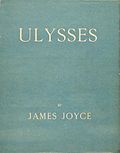Stream of consciousness writing
Stream of consciousness is a term used in literary criticism for a literary technique that reports the thought processes of a person.
If it is done in context with the surrounding world it is called interior or internal monologue. That means it is unspoken, and in some cases could not be spoken. For example, in Mikhail Bulgakov's Heart of a Dog (1925) the first chapter is entirely based on the dog's unspoken thoughts on the world about him.[1]
Stream-of-consciousness writing is typical for the modernist movement. The term was coined by William James in 1890 in his Principles of Psychology. The use of the term in literature is attributed to May Sinclair.
Several famous works that employ stream of consciousness are:
- Édouard Dujardin's Les Lauriers sont coupés (1888)
- Arthur Schnitzler's Leutnant Gustl (1901)
- Nadine Gordimer's July's People
- Shikibu's The Tale of Genji
- Lewis Grassic Gibbon's Sunset Song.
- Dorothy Richardson's Pilgrimage (1915-67)
- James Joyce's Ulysses (in particular Molly Bloom's Soliloquy), as well as A Portrait of the Artist as a Young Man
- Samuel Beckett's Trilogy
- Virginia Woolf's Mrs. Dalloway, To the Lighthouse and The Waves
- William Faulkner's The Sound and the Fury and As I Lay Dying
- T.S. Eliot's The Love Song of J. Alfred Prufrock
- Jack Kerouac’s On the Road
- J.D. Salinger Seymour: An Introduction
- Sam Selvon's The Lonely Londonders
- Marcel Proust's In Search of Lost Time
- William S. Burroughs's Naked Lunch
Stream Of Consciousness Writing Media
Cover of James Joyce's Ulysses (first edition, 1922), considered a prime example of stream of consciousness writing styles
References
- ↑ Bulgakov, Mikhail [1925] 1968. Heart of a Dog. NY: Picador & London Pan Books.
